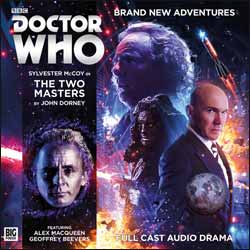|
Click here to return to the main site. Audio Drama Review
The future is dying. All over the universe, gaps are beginning to appear. From the space lanes terrorised by the rag-tag remnants of the once-mighty Rocket Men, to the empire of the Gorlans, stricken by a terrible civil war. Gaps in space/time, portents of the end of everything. Only three beings might prevent it: the Doctor, a renegade Time Lord from Gallifrey; the Master, another renegade Time Lord from Gallifrey… and another Master, yet another renegade Time Lord from Gallifrey. One Doctor, two Masters – what could possibly go wrong…? WARNING: CONTAINS SPOILERS! It would have been possible for me to write a spoiler-free review of this adventure, which concludes Big Finish’s Master trilogy, but it would have ended up being a lot shorter, because much of what I have to say revolves around the big reveal that occurs almost halfway through this two-disc release. Before we get to that point, writer John Dorney sets up a ‘different setting per episode’ format for the first half of this audio drama. As space/time begins to unravel, Parts One and Two each take place in a different ‘island of time’, with Part One focusing on Geoffrey Beevers’s Master and a rematch with Dorney’s recurring creations, the Rocket Men. With their power – and their memories – fading, these once formidable space pirates are a shadow of their former selves, and the writer is soon done with them and ready to move on. Part Two is dominated by Alex Macqueen’s incarnation, who is masquerading as the captain of a starship in the middle of a space war. No doubt with the actor’s bald head in mind, Dorney has this version of the Master trotting out some familiar Captain Picard catchphrases, such as “on screen” and “I’ll take it in my Ready Room”. Then, halfway through the story, the two Masters come together – and to an extent the plot comes apart. Unlike the Doctor / Master combos of the previous two releases, the Seventh Doctor (Sylvester McCoy) has met both of these Masters before. Perhaps concerned that simply having them all meet up would not be sufficiently novel (I think it would have been), the writer also works in a complex set of circumstances in which the two Masters swap bodies. To further complicate matters, it transpires that it was Macqueen’s Master who caused his earlier self to become horribly burned – creating the scarred form seen in The Deadly Assassin and The Keeper of Traken. Now, I had always assumed that the Master had been in his Roger Delgado incarnation prior to being emaciated. (So had John Peel, who wrote his version of the incident in the novel Legacy of the Daleks. Poor old John Peel – Big Finish seems determined to invalidate his work! First Terror Firma contradicted his earlier novel War of the Daleks, and now this!) Of course, it would be impossible to hear the voice of the late Delgado reprising his role here (not without resorting to a disrespectful impersonation or computer-generated sample) and so Dorney hits upon the pretty neat idea of the Master looking and sounding like Geoffrey Beevers prior to turning all crispy. The only trouble with this bit of retroactive continuity is that logically the Master at this point in his lives should therefore sound like Peter Pratt, the actor who played him in The Deadly Assassin – I had also always assumed that the Master achieved a partial regeneration from Pratt to Beevers following his exposure to the energies of the Eye of Harmony in that story. But, of course, hearing from the late Peter Pratt would be as impossible as hearing from the late Roger Delgado. A more serious problem is that the body-swapped Masters don’t seem all that different from their usual selves. Well, maybe they do a little here, but not noticeably during the previous two stories in this trilogy. Following all the flashbacks and explanations that account for most of Part Three, the fourth and final episode of this release boasts plenty of witty banter and sarky comments exchanged by the two Masters, and an ingenious plan on the part of the Doctor (who is nearing the end of his seventh life and will soon be encountering the snake form of the Master – who also gets a mention here). Nevertheless, the second disc feels low on incident compared to the first. Perhaps I’m just miffed because some of my fan assumptions have been so thoroughly overturned (just as some fans were disappointed by the depiction of Time Lord society in The Deadly Assassin back in the day), but for me The Two Masters is uneven and overcomplicated, and that’s why I don’t love it as much as many other reviewers clearly do. 7 Richard McGinlay Buy this item online
|
|---|

